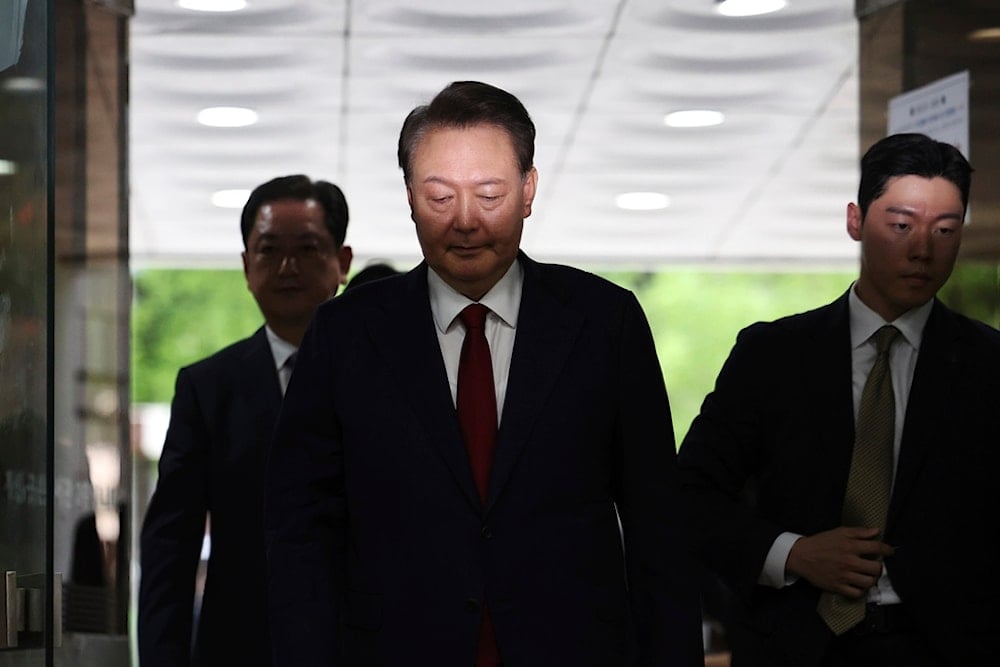South Korea's ousted Yoon defies prosecutors, blocks warrant execution
Former South Korean President Yoon Suk Yeol defies special prosecutors’ attempt to enforce his detention warrant, escalating tensions in a high-stakes investigation into abuse of power and martial law.
-

Former South Korean President Yoon Suk Yeol (center) arrives at a court to attend a hearing to review his arrest warrant requested by special prosecutors in Seoul, South Korea, Wednesday, July 9, 2025. (Kim Hong-Ji/Pool Photo via AP)
Efforts to enforce a detention warrant against former South Korean President Yoon Suk Yeol were halted on Friday after he refused to comply with special prosecutors, according to a report by Yonhap News Agency. The failed attempt came amid mounting legal and political fallout from Yoon’s brief and controversial tenure, which ended in impeachment and formal removal from office earlier this year.
Assistant Special Counsel Moon Hong-ju, joined by a prosecutor and an investigator, visited the Seoul Detention Center in Uiwang, where Yoon has been held since July under a renewed arrest warrant. The team reached the area just outside Yoon’s cell and instructed prison officials to bring him out. "We could not complete the execution of the detention warrant for former President Yoon due to his adamant refusal," the team confirmed following the confrontation.
The warrant stems from an ongoing special investigation into allegations that Yoon and his wife, Kim Keon Hee, interfered in the nomination process for the 2022 parliamentary by-elections. Despite being summoned twice this week for questioning, Yoon declined to appear, citing "his deteriorating health." Prosecutors have stated they are prepared to forcibly bring him in if necessary.
Martial Fallout
Yoon’s downfall began in December 2024 when he attempted to impose martial law on the night of December 3, an act swiftly overturned but one that sparked mass public outcry and immediate calls for his impeachment.
After his impeachment, he was arrested in January, briefly released in March due to procedural errors, and re-detained in July under a new court-approved warrant. Prosecutors have charged him with abuse of power, falsifying state documents, obstruction of duties, and incitement to insurrection. If indicted, Yoon could face extended pretrial detention and, in a worst-case scenario, life imprisonment.
The investigation has widened in recent weeks. Authorities have arrested Yoon’s former Interior Minister, Lee Sang-min, on charges of suppressing media coverage related to the martial law declaration, and prosecutors suspect a coordinated effort within Yoon’s administration to manipulate both public messaging and institutional responses during the crisis.
Read more: US-South Korea trade deal slashes tariff, secures $350bln investment
Yoon was formally ousted in April by a unanimous Constitutional Court ruling, making him the shortest-serving elected president in South Korean history. His removal triggered a snap election in June, in which Democratic Party of Korea (DPK) leader Lee Jae-myung secured a landslide victory, marking a sharp political turn from the Yoon administration.
Despite Yoon’s continued resistance, the special counsel’s office has vowed to press forward with its investigation. Prosecutors have cited concerns that the former president may destroy evidence or exert influence over other figures involved in the case. With his legal team invoking health concerns and declining cooperation, the clash between the former head of state and the justice system appears far from over.

 3 Min Read
3 Min Read










